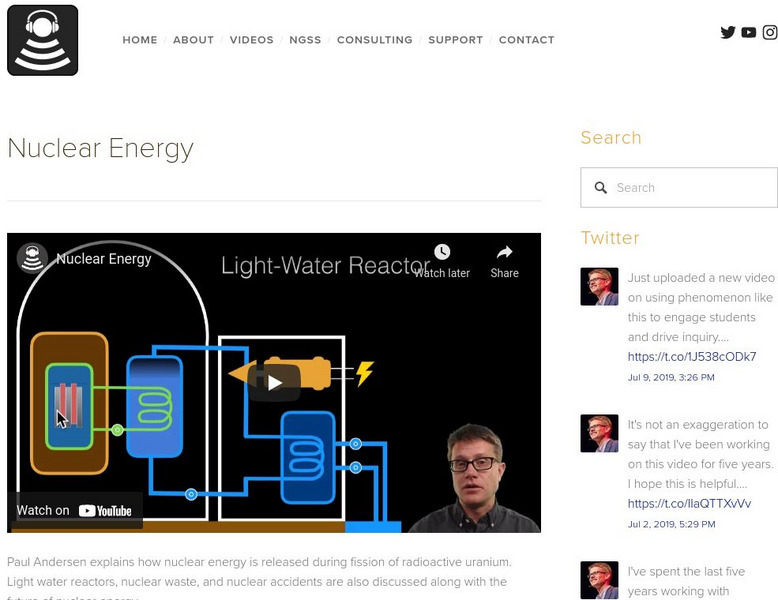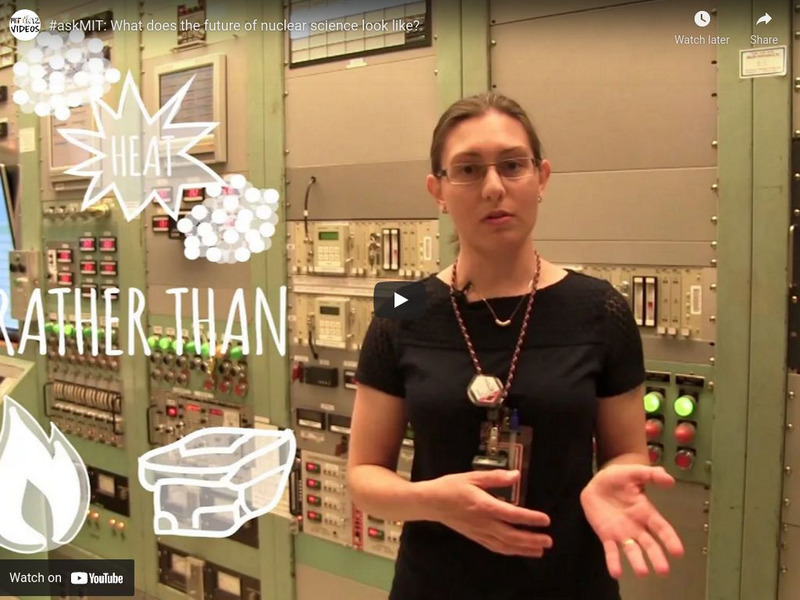Hi, what do you want to do?
Kurzgesagt – In a Nutshell
3 Reasons Why Nuclear Energy Is Awesome!—Part 3
Nuclear energy saves more lives than it harms. A powerful video explains the great things about nuclear energy and why we should increase nuclear power plants. It highlights the benefits for global warming and a new way to make nuclear...
Kurzgesagt – In a Nutshell
Nuclear Energy Explained: How does it work?—Part 1
In 1942, scientists first observed the first man-made nuclear reactor. The video introduces the history of nuclear energy from military development through today. It highlights the types of nuclear reactors built and the reasons as well...
Kurzgesagt – In a Nutshell
3 Reasons Why Nuclear Energy Is Terrible!—Part 2
Many people argue nuclear energy destroys countries and should not be used. An enlightening video offers the three biggest reasons to stop nuclear energy usage. From nuclear weapons to nuclear waste, more than 70 years of nuclear...
Crash Course
Humans and Energy: Crash Course World History 207
Is flipping a switch and lighting up a room normal or miraculous? It depends where—and when—you live. Crash Course World History covers historical uses of energy, current uses of energy, and the possible future uses of energy with an...
MinutePhysics
How To Detect A Secret Nuclear Test
Discover how science is ready to protect the world against nuclear explosions. An interesting lesson describes how science monitors the world for evidence of nuclear explosions. By using technology to detect waves, it is possible to...
American Chemical Society
What Is Energy?
Kids sure do seem to have a lot of energy, but what exactly is energy? A video explains many different types of energy, starting with potential and kinetic. It highlights the most common forms of potential energy, including...
TED-Ed
What Are the Challenges of Nuclear Power?
Engineering challenges, construction costs, and disasters are some of the challenges when it comes to nuclear energy. Watch a video that explains each of these and more in detail.
SciShow
The World's First Human-Made Nuclear Reactor
Many consider nuclear reactors to be big and scary, yet the first human-made nuclear reactor as described by this video was neither of these things. Built on a squash court in Chicago, the reactor was powerful enough to turn on a...
SciShow
Liquid Fluoride Thorium Reactors (LFTR): Energy for the Future?
Cheaper and cleaner nuclear power plants were invented 50 years ago in the United States, yet the first to be built are in China. The video explains how these nuclear power plants work. They run on thorium, which is common and more...
Bozeman Science
Nuclear Reactions
How does a nuclear reaction create such a large amount of energy? The idea of a nuclear reaction develops from a comparison with chemical reactions. The video instructor then explains the process of both nuclear fission and fusion. This...
DoodleScience
Non-Renewable Energy Resources
What is a fossil fuel and why is it important? The video explains fossil fuels as an energy source and how they may be harmful to the environment. Nuclear energy is an alternative with its own implications.
DoodleScience
The Energy Types
How many types of energy can you name? A video introduces all 10 types of energy and gives a brief explanation of each.
MinutePhysics
How the Sun Works: Fusion and Quantum Tunneling
There may be nothing new under the sun, but astrophysicists constantly are learning new things about the sun! In this minute-long clip, learn the physics of fusion in the sun and the possibility that quantum tunneling is happening...
TED-Ed
Cambridge Ideas - How Many Lightbulbs?
Humans have become addicted to fossil fuels. From pumping oil into our cars, to burning natural gas to heat our water, or using coal to create electricity that lights our homes, we are constantly relying on these nonrenewable resources....
Curated OER
Nuclear Reactions
Part of a longer film, "Our Friend the Atom," this segment focuses on how nuclear radiation was discovered. Ping-Pong balls and mouse-traps combine to show a very visual demonstration of how nuclear reactions occur. The dangers of...
Curated OER
Radioactive Isotopes
A Geiger counter is used to detect emission of alpha particles, beta particles, and gamma rays. The teacher experiments to find out which materials block each of these forms of radiation. The camera is focused on the measuring instrument...
Curated OER
Nuclear Fusion: Energy of the Future
Around 80 percent of the world's energy demands are currently met by fossil fuels. Nuclear fusion is being explored as a possible renewable energy source for the future. Acquaint your advanced physics learners with the process of nuclear...
Curated OER
Nuclear Reactor
Bright and bold graphics are displayed as a narrator expounds on how a nuclear reactor functions. The clip is extremely short, and therefore not particularly worth hooking up your projector for. However, it is interesting and informative...
PBS
Pbs Learning Media: Energy Sources
This video segment illustrates a variety of energy sources used to generate electricity, some of which are in use and some of which are under exploration. [6:09]
PBS
Pbs Learning Media: Nuclear Reaction: Fission
This video segment adapted from FRONTLINE looks at nuclear fission as an energy source that can be used to generate electricity. [2:49]
Bozeman Science
Bozeman Science: Nuclear Energy
Paul Andersen explains how nuclear energy is released during fission of radioactive uranium. Light water reactors, nuclear waste, and nuclear accidents are also discussed along with the future of nuclear energy. [9:06]
Massachusetts Institute of Technology
Mit: #Ask Mit: What Does the Future of Nuclear Science Look Like?
Senior reactor operator at the MIT Research Nuclear Reactor, Sarah Don discusses what the future of nuclear science looks like. [2:00]
PBS
Pbs Learning Media: Germany Phases Out Nuclear Power
Learn about Germany's controversial decision to end its nuclear energy program. [4:45]
Science Friday Initiative
Science Friday: Future of Nuclear Energy
While solar, wind, and biofuels have been garnering the lion's share of public and political attention in plans to remake the nation's energy portfolio, some nuclear energy advocates want more emphasis put on nuclear energy. But what...


























